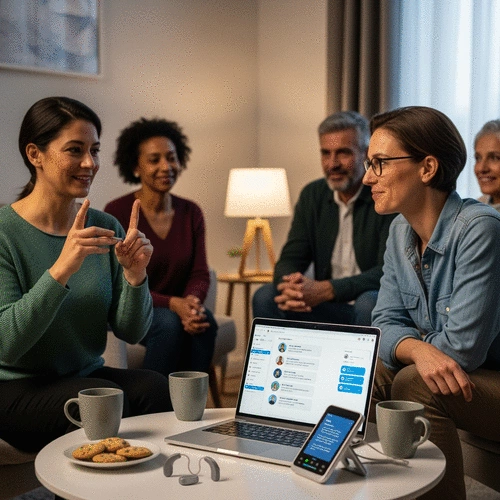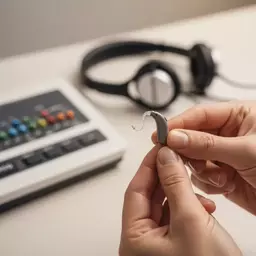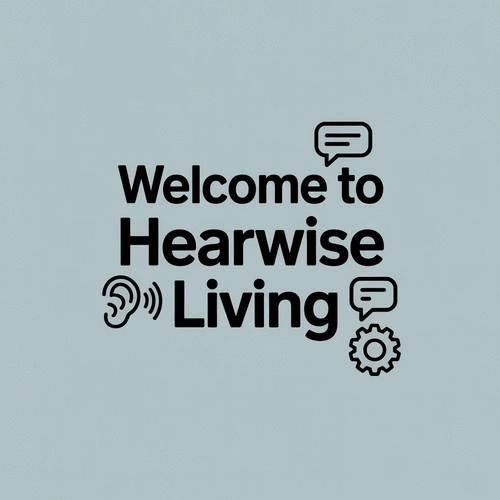Choosing to connect with others facing similar challenges can transform your journey with hearing loss. Support groups are more than just gatherings; they are communities that foster understanding and empowerment. Consider the impact they can have on your well-being and quality of life.
What You Will Learn
- Support groups foster emotional relief by providing a dedicated space for shared experiences and understanding.
- Members gain practical advice and insights that enhance their awareness of hearing loss and available resources.
- Engaging with a community helps improve communication skills, making social interactions more manageable.
- Advocacy within these groups can lead to greater community awareness and policy changes that benefit individuals with hearing loss.
- Choosing the right support group involves considering goals, format, size, and inclusivity to ensure a comfortable fit.
- Online safety and privacy are crucial in digital communities; adjust settings and familiarize yourself with group guidelines.
- Peer support programs can provide mentorship and create lasting friendships, enriching the journey of overcoming hearing loss.
The Power of Hearing Loss Support Groups
Connecting with others facing similar challenges can significantly enhance well-being and provide practical support. Below are key benefits and considerations for engaging with hearing loss communities.
Why Connection Matters
- ✓Shared Experiences: Fosters belonging, reduces isolation.
- ✓Emotional Support: Provides relief and understanding.
- ✓Practical Advice: Offers tips and resources from peers.
Benefits of Support Groups
- ✓Increased Awareness: Insights into types and tech.
- ✓Stronger Communication: Improved strategies.
- ✓Encouragement & Motivation for personal goals.
Choosing a Support Group
- ✓Focus & Goals: Align with personal needs.
- ✓Format: In-person vs. online connections.
- ✓Size: Small (intimate) vs. large (broad perspectives).
- ✓Inclusivity: Welcoming diverse experiences.
Role of Advocacy
- ✓Access to Resources: Aids, devices, services.
- ✓Policy Changes: Influencing public policies.
- ✓Community Awareness: Destigmatizing hearing loss.
Understanding the Importance of Support Groups for Hearing Loss
When navigating the challenges of hearing loss, connecting with others who share similar experiences can be incredibly beneficial. Have you ever felt isolated or misunderstood because of your hearing struggles? You're not alone. Support groups provide a safe space for individuals to share their stories, seek advice, and build a sense of community. Understanding the importance of support groups for hearing loss management is vital. These groups foster a culture of empathy and understanding, allowing members to learn from each other's journeys. They can be a lifeline, offering emotional support and practical strategies to cope with hearing challenges.
Why Connecting with Others Matters for Hearing Loss Management
Building connections with fellow individuals experiencing hearing loss can significantly impact your well-being. Here’s why connecting with others matters:
- Shared Experiences: Hearing loss can feel isolating, but sharing your experiences with others can create a sense of belonging.
- Emotional Support: Having a dedicated group of people who understand your challenges can provide immense emotional relief.
- Practical Advice: Members often share tips and resources that have worked for them, offering practical solutions to common issues.
By joining a support group, you’re not just finding an audience for your struggles; you’re discovering a community ready to uplift and guide you on your journey!
Benefits of Joining Hearing Loss Support Groups
Support groups offer a plethora of benefits that can enhance your quality of life. Here are some notable advantages:
- Increased Awareness: Members gain insights into different types of hearing loss and available technologies.
- Stronger Communication Skills: Engaging with others helps improve communication strategies, making conversations easier.
- Encouragement and Motivation: Witnessing others' successes can inspire you to take steps towards your own goals.
Additionally, joining a support group can help you feel empowered and informed, allowing you to better advocate for your hearing health. You deserve the tools and knowledge to navigate this journey confidently!
The Role of Hearing Loss Advocacy in Support Networks
Advocacy plays a crucial role within support networks, creating a platform for individuals to voice their concerns and needs. Through group discussions, members can discuss important topics such as:
- Access to Resources: Ensuring everyone knows where to find hearing aids, assistive devices, and rehabilitation services.
- Policy Changes: Advocating for changes in public policies that affect individuals with hearing loss.
- Community Awareness: Raising awareness about hearing loss and destigmatizing the challenges associated with it.
By participating in advocacy efforts, you contribute to a collective voice that can help bring about meaningful change for the hearing loss community. Together, we can make a difference!
Did You Know?
According to the National Institute on Deafness and Other Communication Disorders, approximately 15% of American adults report some trouble hearing. This statistic underscores the importance of community and support for those experiencing hearing loss. Remember, you are not alone!
Taking the Next Steps to Connect with Hearing Loss Communities
Finding the right support group is crucial for anyone navigating the challenges of hearing loss. It's essential to consider what you need most from a community. Whether you're looking for emotional support, practical advice, or just a friendly conversation, these groups can offer the connection you seek. At HearWise Living, we encourage you to explore the various options available to find the perfect fit! You can also find valuable resources on finding local hearing loss support to help you get started.
How to Choose the Right Support Group for Your Needs
When selecting a support group, reflect on the aspects that resonate with you. Here are some key factors to consider:
- Focus and Goals: Ensure the group's mission aligns with your personal needs, whether that's emotional support or technical advice.
- Format: Decide if you prefer in-person meetings or online connections, as both have unique benefits.
- Size: Smaller groups may foster more intimate discussions, while larger groups can provide a broader range of perspectives.
- Inclusivity: Look for groups that are welcoming and respectful of diverse experiences and backgrounds.
Choosing the right support group is about finding a place where you feel comfortable and heard. Remember, it’s perfectly okay to try out a few different groups to see which one feels like home!
Safety and Privacy Considerations in Online Communities
As you explore online communities, it's vital to prioritize your safety and privacy. Here are some tips to consider:
- Profile Privacy: Adjust your profile settings to control who can see your information.
- Anonymous Participation: If you're uncomfortable sharing personal details, consider joining groups that allow anonymous participation.
- Community Guidelines: Familiarize yourself with the group's rules to ensure a respectful and supportive environment.
Being part of a community should feel safe and empowering. By taking these precautions, you can engage more freely and connect with others who understand your journey.
Exploring Peer Support Programs for Enhanced Connection
Peer support programs can be an invaluable resource for individuals experiencing hearing loss. These programs often pair you with someone who has faced similar challenges, facilitating a deeper understanding and connection. Consider these forms of peer support:
- Mentorship: Experienced members can guide newcomers through their hearing loss journey.
- Group Meetings: Regular gatherings provide a space to share experiences and strategies.
- One-on-One Support: Personal connections allow for focused support and encouragement.
By engaging in peer support programs, not only do you gain insight from others, but you also create lasting friendships that can enrich your life and help combat the isolation often felt with hearing loss. Learning about enhancing home communication with hearing loss can also provide additional practical strategies.
Encouraging Active Participation and Engagement
Once you've found a community that resonates with you, it's time to dive in! Active participation helps not only you but also others in the group. Sharing your experiences can create a ripple effect of support and encouragement.
Share Your Story: The Power of Personal Experiences
Your personal journey is powerful and can inspire others. When you share your story, you might find that your experiences resonate with someone else, making them feel less alone. Consider these approaches:
- Storytelling: Share your journey in a way that highlights the challenges and victories.
- Q&A Sessions: Engage with the group by asking for feedback on specific challenges you face.
- Resource Sharing: If you've found helpful materials or strategies, pass them along!
Remember, your voice matters! By sharing openly, you're contributing to a supportive community where everyone can learn and grow together.
Incorporating Multimedia Elements for Better Interaction
In today’s digital age, multimedia can significantly enhance communication in support groups. Consider utilizing:
- Videos: Share tutorials or personal vlogs that illustrate your experiences with hearing loss.
- Podcasts: Discuss topics of interest in a conversational format that others can listen to at their own convenience.
- Infographics: Share visual information that highlights tips and strategies for managing hearing loss.
Using multimedia not only makes your contributions more engaging but also helps others to relate to your experiences in a new way. Let’s embrace technology to bridge the gaps!
Frequently Asked Questions
Q: What are the main benefits of joining a hearing loss support group?
A: Joining a hearing loss support group offers numerous benefits, including emotional support through shared experiences, practical advice and resources from peers, increased awareness of different types of hearing loss and available technologies, improved communication skills, and motivation to achieve personal goals.
Q: How do support groups contribute to advocacy for individuals with hearing loss?
A: Support groups play a crucial role in advocacy by creating a collective voice for individuals with hearing loss. They help in advocating for better access to resources like hearing aids and rehabilitation services, influencing public policy changes, and raising community awareness to destigmatize hearing loss.
Q: What should I consider when choosing the right support group for my needs?
A: When choosing a support group, consider its focus and goals to ensure they align with your personal needs (e.g., emotional support, technical advice). Evaluate the format (in-person vs. online), the size (small for intimacy, large for diverse perspectives), and the group's inclusivity to ensure a welcoming environment.
Q: Are there any specific safety and privacy tips for participating in online hearing loss communities?
A: Yes, prioritize your safety and privacy in online communities by adjusting your profile settings, considering anonymous participation if you're uncomfortable sharing personal details, and familiarizing yourself with the group's community guidelines to ensure a respectful and secure environment.
Q: How can peer support programs enhance my connection within the hearing loss community?
A: Peer support programs enhance connection by pairing you with experienced individuals who have faced similar challenges, fostering deeper understanding and mentorship. These programs often include group meetings and one-on-one support, helping you gain insights, build confidence, and create lasting friendships.
Joining Workshops for Hearing Loss: Expanding Your Knowledge
Workshops provide excellent opportunities for learning and personal development. Engaging in workshops can:
- Enhance Skills: Gain practical skills related to hearing technology or communication strategies.
- Build Confidence: Workshops often involve role-play scenarios that can boost your self-esteem in social situations.
- Foster Networking: Meet others who share your interests and challenges, creating a wider support network.
By participating in workshops, you're not just learning; you're also building connections with others who are on a similar path. Let's grow together!
Join the Conversation: Your Role in the Hearing Loss Community
Your involvement in the hearing loss community can make a profound difference—not just for you, but for others who share this journey. Together, we can create a supportive environment where everyone feels valued and heard.
Encouraging Others to Participate and Share Resources
As you engage with your support group, encourage others to share their resources and stories. Here’s how you can inspire participation:
- Invite Friends: Bring someone along to meetings to introduce them to the community.
- Start Discussions: Pose questions or topics that stimulate conversation among group members.
- Share Social Media Posts: Use your networks to spread the word about upcoming events or group discussions.
Every voice counts, and your efforts to foster participation can create a more vibrant community!
Call to Action: Connect with a Group That Fits You
Don’t hesitate to take that first step! If you haven’t already, explore local or national support groups that resonate with your needs. At HearWise Living, we are here to guide you in finding the connections that can uplift and empower you. You can also explore options for choosing the right hearing aid to further support your hearing journey.
Utilizing Social Media for Hearing Loss Awareness
Social media is a powerful tool for creating awareness about hearing loss. By sharing your experiences and insights online, you can:
- Educate Others: Post informative content that raises awareness about hearing health.
- Connect with Allies: Find others who are passionate about hearing loss advocacy.
- Participate in Campaigns: Join or create campaigns that promote hearing loss awareness and resources.
Let’s harness the power of social media to foster a community that thrives on support and education!
Recap of Key Points
Here is a quick recap of the important points discussed in the article:
- Importance of Support Groups: Connecting with others who share similar experiences fosters empathy and provides emotional support for managing hearing loss.
- Benefits of Participation: Joining support groups enhances awareness, communication skills, and motivation, empowering individuals to navigate their hearing journeys more effectively.
- Advocacy Role: Support networks can advocate for access to resources, policy changes, and community awareness, amplifying the voices of individuals with hearing loss.
- Choosing the Right Group: Consider focus, format, size, and inclusivity when selecting a support group that aligns with your needs.
- Safety in Online Communities: Prioritize privacy and adhere to community guidelines to ensure a respectful and secure environment.
- Engagement Strategies: Actively participate by sharing your story, utilizing multimedia, and encouraging others to join the conversation.








